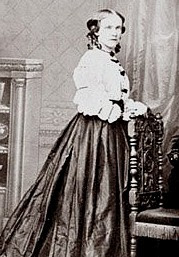Frances Ridley
Havergal -
The
"Sweet Singer and Yet Strong"
1836-1879
“…there must be the
music of God's own love in that fair singer's heart;
and that so there
was joy in her face, joy in her words, joy in her ways.”
~ An Irish schoolgirl (upon meeting “Miss Frances”
in her 20th year)
Frances Ridley Havergal was the author of approximately fifty Christian hymns and two hundred poems. She is remembered as an
example of what a Christian can and ought to be - of living a life wholly
yielded to Jesus Christ. She has been referred to as
"the sweetest voice of hymnody," and "the consecration
poet."
Frances,
affectionately known as “Fannie” by family and friends, was born, the sixth and
youngest child of the Rev. William Henry Havergal and his wife, Jane, December
14, 1836, at Astley, Worcestershire, England.
Her father was, at the time of Frances’ birth, Rector of Astley Church and
known as a writer, composer and hymn writer of about 100 hymns, and publisher of
sermons and religious pamphlets. Mr.
Havergal and his wife were both very earnest, spiritually-minded, evangelical
Christians; and their home has been characterized as “rich in all holy
influences, in much beauty, and in a delightful musicalness.” Mr. Havergal
was characterized as "a living song…filling the house with holy melodies”.
Despite being thrown out of a carriage
in 1829 and receiving a concussion which disabled him for some years, causing
loss of most of his sight by 1832, he published the Old Church Psalmody" Op. 43, in 1847, which is considered the
parent of most modern collections of church hymn tunes.
 |
| Rev. Henry Havergal |
Frances was a beautiful, yet delicate child, who was not able to
attend school regularly, but
was bright, happy, and so full of life and vivacity, that her father called her
his "Little Quicksilver." She
was very fond of music from her babyhood, and sang almost as soon as she could
talk. One of her godmothers used to say:
"I believe Fanny will die singing" [and she certainly did!] When
Frances was three, it is said that she could read easy books, and was often
found, hidden under a table with some engrossing story. Frances wrote verses from the age of seven with remarkable fluency,
and her poems were soon admitted into the British Christian magazine, Good Words and other religious
periodicals.
The
first sorrow of Frances life, when she was eleven years old, was the death of
her dear mother in 1848. After her
mother's death, Frances spent much time with her eldest sister, Miriam, at
Oakhampton, where she is remembered as “a clever, amusing child, sometimes a
little willful and troublesome from mere excess of animal spirits, but always
affectionate and grateful for any little treat; much given to reading poetry,
and not so tidy as she afterwards became, for she used to leave books about in
the hay-loft, manger, and all sorts of garden nooks.”
In
1851 at the age of fourteen, Frances attended a school taught by a Mrs. Teed,
under whose prayerful and loving influence her religious desires were deepened
and strengthened. It was not until a
year later that she first experienced real faith in Jesus as her Savior. During a visit at Okehampton with Caroline
Cooke, who afterwards, in July of 1852, married her father and became her
"loved mother" (as Frances loved to call her), she was enabled to
trust the Lord Jesus, and earth and heaven were bright from that moment.
From
the time of her conversion Frances lived a very earnest Christian life. She attended schools and colleges in England
and Germany, and afterwards visited different parts of England, Switzerland,
Wales, Ireland, and Scotland; but everywhere she went she took a bold stand for
Christ. Frances had a thorough training
in linguistics and music and was a pianist and singer. Her scholastic achievements included
proficiency in several modern languages, in addition to Latin and Hebrew.
When
Frances returned to England in December 1853,
although supposed to be "finished," Frances continued her studies,
and with her father's tutelage learned enough Greek to enjoy studying the New
Testament. In July, 1854, when she was
eighteen, she was confirmed in Worcester Cathedral. She always observed the anniversary of her
confirmation by spending the day in prayer and holy retirement.
 |
| Worcester Cathedral |
Frances,
at eighteen and nineteen, wrote extensively. She asked the Lord to direct her writing, and
to give her every word, and even the rhymes of her poetry. Frances sent her
works to various contests, got prizes for them, and gave money to the Church
Missionary Society. Throughout her life Frances
energetically engaged in religious and philanthropic work. She
became closely associated with the Keswick Convention (as well as other
gatherings such as the Mildmay Conference and Moody and Sankey’s meetings).
Frances first well-known hymn was written in 1859, during another
visit to Germany, when she was twenty-three years old. It was inspired by a
picture of the Crucifixion under which were the words: "I gave My life for
thee." The hymn nearly went into
the fire, for Frances was dissatisfied with her work; but instead of burning
it, on second thought she put it, crumpled and singed, into her pocket. Later on she read the verses to a dear old
Christian in an almshouse, who was so delighted with them that the young
authoress made copies and sent them to friends.
Frances wrote
some of her own tunes for some of her hymns and her father wrote the music for
others.
Frances also wrote many small devotional tracts and narratives in
prose and numerous
little books of poems, all marked by the same earnest and practical piety. Themes for her writings were
faith, consecration, and service. Her religious poetry became
exceedingly popular in evangelical circles. She published collections of her poems and
hymns in many separate volumes; the earliest is dated 1870. Frances’
father died suddenly in 1870, to the intense grief of his family. This loss,
however, as all other losses, only made the Divine promises more real to
Frances. Her hymn, "Thou Art the
Helper of the Fatherless," flashed brightly upon Frances soon afterwards
when puzzling over a tune her father would have decided at once. "I think," she adds, "that even
in music the Lord is my helper now." She prepared for the press a new edition of her father’s Psalmody, and now added her own hymn tunes to
her other work.
In
December 1873, Frances declared that she had received a blessing that had
"lifted her whole life into sunshine, of which all she had previously
experienced was but as pale and passing April gleams compared with the fullness
of summer glory." This blessing
came to her through a tiny book with the title, All for Jesus, which she received in a letter from a friend. She read it carefully and its contents
arrested her attention and set forth a fullness of blessing to which she felt
she had not attained. She was gratefully conscious of having for many years
loved the Lord, and delighted in His service; but "I want," she
wrote, "to come nearer stil', to have full realization of John
xiv.21." Frances often referred to
this experience, which made the closing years of her life such a blessing to
others.
Frances’ whole life was now
lifted to a higher plane, and her few remaining years were the richest of her
life, richest in Christian experience, and richest in service for her King.
Wherever she went, her life was full of service, and her words were winged with
a new spiritual power. It was at this time, too, that she wrote her great
consecration hymn, "Take my Life and Let it Be."
Frances
was a contemporary of the well-known American hymn writer, Fanny Crosby
(1820-1915). Although these two gifted
women never met, each was an admirer of the other. In a letter sent by Frances to Fanny Crosby,
she wrote:
“Dear
blind sister over the sea--
An English heart goes forth to thee.
We are linked by a cable of faith and song,
Flashing bright sympathy swift along
One in the East and one in the West,
Singing for Him whom our souls love best.
Singing for Jesus! Telling His love
All the way to our home above,
Where the severing sea, with its restless tide
Never shall hinder and never divide.
Sister, what shall our meeting soon be
When our hearts shall sing and our eyes shall see?”
An English heart goes forth to thee.
We are linked by a cable of faith and song,
Flashing bright sympathy swift along
One in the East and one in the West,
Singing for Him whom our souls love best.
Singing for Jesus! Telling His love
All the way to our home above,
Where the severing sea, with its restless tide
Never shall hinder and never divide.
Sister, what shall our meeting soon be
When our hearts shall sing and our eyes shall see?”
In
the late 1870s, Frances’ time was occupied with her writing, in giving Bible
readings and addresses, in visiting the poor, and in doing needlework for the
Zenana missions and for the poor. In 1877 she took up temperance work as well.
She spent much time in visiting from house to house, to read the Bible and
point souls to Christ. She often gave Bible readings or addressed meetings in
drawing rooms and other places, and frequently led consecration meetings. The
first consecration meeting she was ever in was conducted by herself, and it was
a time of rich blessing. She often sang in churches, hospitals, and other
places. Every morning she spent much time in studying and marking her Bible.
On her step-mother's death in 1878, Frances and her sister, Maria,
removed from Leamington to South Wales, near the Mumbles on the Welsh coast,
where they set up
housekeeping together. Frances was so
tired, that even the sea air, and perfect rest failed to refresh her for some
time. She was only forty-two when she
died on June 3, 1879. Frances had chosen
1 John 1:7, “The Blood of Jesus Christ His Son cleanseth us from all sin."
to be placed on her coffin, around and underneath her name; “the word from
heaven, under the shelter of which she could peacefully, yea triumphantly, fall
asleep.” This text was also engraved on
her tombstone at Astley, Worcestershire.
 |
| Astley |
Her sister, Maria, also published, in 1880, Frances’ autobiography, Memorials of Frances Ridley Havergal. The influence of this autobiography was noted
as remarkable as that of Frances’ hymns and poems. Her family and friends, following her
death, took up a large collection, and, as a memorial to her, sent this sum
abroad to be used by the native women in India to share the gospel with others.
Francis’
legacy lives on long after her passing. Havergal Ladies’College, (aka Havergal College) founded in 1894 in Toronto, Canada is named after Frances.
Her books and poems are still available
to the public, and her hymns are sung by millions of Christians.













.jpg)




.jpg)




.jpg)









.jpg)
















































.jpg)














